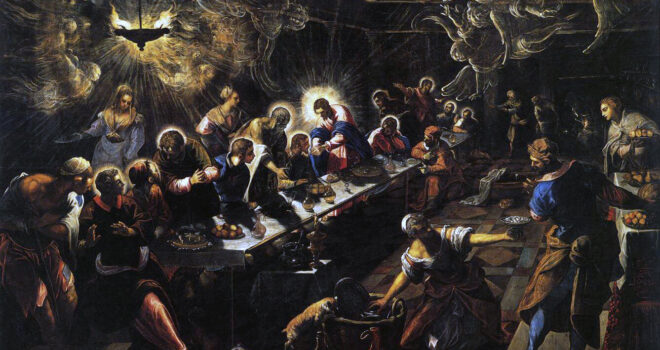When Judas had left them…
Judas left Jesus to betray Him, sell Him for silver, and bring those who would arrest Him, torture Him, condemn Him, and then hand Him over to the Roman soldiers for crucifixion. Jesus knew exactly Judas’s purpose, what Judas’ departure meant, and the great pain and suffering that it would cost Him. But Jesus did not do anything to prevent Judas from leaving.
This tells us two things about how Jesus loves.
Firstly, He loves Judas ultimately for the sake of His Father. He did not love Judas because he was a good and loyal disciple who would show gratitude and fidelity to Him. Jesus always and forever loves Judas for the sake of His Father. This is why He could exclaim in the face of such painful rejection and betrayal, “Now is the Son of man glorified, and God is glorified in Him.”
Secondly, Jesus loves Judas freely and leaves him free to either love or reject Him. Jesus does not force, control, or manipulate Judas to love Him back in any way. He leaves Judas free to be faithful or unfaithful to Him.
This is also how Jesus loves each one of us. Everything that Jesus did for us—His Incarnation, teaching, miracles, ministry, forgiveness, suffering, death, resurrection, Eucharistic presence—He did ultimately for His Father because He saw us as precious gifts of His Father to Him. This is why His love for us is strong and enduring: “Father, they are your gift to me. I wish that where I am they also may be with me that they may see my glory that you gave me” (Jn. 17:24).
Jesus will never reject us, no matter how unfaithful we are to Him. For the sake of His Father, He will never stop laboring for our salvation, as He says:
I will not reject anyone who comes to me, because I came down from heaven not to do my own will but the will of the one who sent me. And this is the will of the one who sent me, that I should lose nothing of what He gave me, but that I should raise it on the last day. (Jn. 6:37-39)
However, He will never force us to respond to His love. He leaves us free to either reject or accept it. He leaves us free to believe in His words, do His will, receive His forgiveness, accept His grace, repent of our sins, believe in His Eucharistic presence, or follow Him in love.
This is how Jesus asks us to love others: “I give you a new commandment: love one another. As I have loved you, so you also should love one another.” We are not to love indiscreetly but to love others for God’s sake and glory, and leave them free to love us back or not. It is only when we love others like Jesus has loved us that His love will renew us interiorly, fill us with His life, and make us His own people. “This is how all will know that you are my disciples, if you have love for one another” (Jn. 13:31-35).
Ever wonder why we speak so much about love, yet find ourselves sad, angry, afraid, depressed, addicted, and discouraged? It is because, although we may speak ad nauseam about love, we may at the same time be rejecting Christlike love, instead settling for a worldly and selfish kind, such as when we love only when we have prospects of some personal gain. Or our love is driven by our desire for power over others, material possessions, or fleeting pleasure. Or we slowly hold back on love when our good feelings are threatened. Perhaps we want to control and manipulate those we claim to love to get them to do what we desire. This is why our love does not fill us with new life and a sense of belonging to God.
Jesus suffered greatly in the hands of those whom He loved; “He came to what was His own but His own did not accept Him” (Jn. 1:11). Herod wanted to kill Him from the moment of His birth, the Jewish leaders opposed Him, His disciples betrayed and denied Him, and those who benefitted from His teaching and miracles cried out for His crucifixion on Good Friday. But Jesus never stopped loving the way that He did. He was firmly resolved to love others in this way.
Likewise, when we choose to love others as Jesus has loved us, we too will suffer at the hands of our loved ones. We will face ingratitude, criticism, rejection, isolation, indifference, coldness, betrayal, contradictions, misunderstanding, persecutions. What then do we do when we face the huge challenge of loving like Jesus?
We can learn from Paul and Barnabas in their experience at Lystra. Their missionary success in this city was short-lived.
Some Jews from Antioch and Iconium arrived and won over the crowd. They stoned Paul and dragged him out of the city, supposing that he was dead. But when the disciples gathered around him, he got up and entered the city. (Acts 14:19-20)
This humiliation and violence did not dissuade the Apostle to the Gentiles in spreading the love that he had experienced in Jesus. A few days later, the apostles “returned to Lystra and to Iconium and to Antioch.” They also brought a powerful message to those who had tried to kill them: “It is necessary for us to undergo many hardships to enter the kingdom of God” (Acts 14:21-22).
The disciples firmly resolved by the grace of God to love like Christ because that was the only way to overcome the hardships of discipleship and enter God’s kingdom of love. We too can make a similar resolve, by the grace of God, to love others for God’s sake and love them freely without expecting our love to be favorably reciprocated.
We encounter this God of love in the Eucharist, where He loves us forever for the sake of the Father, and His love leaves us free to love Him back or not. Let us receive this love today and always with utmost gratitude and love as the amazing gift that it is. Let us also believe in this undying love that Jesus has for us sinners. By the power of this grace, we can also resolve to love all persons as Jesus has loved us.
Our risen Lord will surely reward us for our pains and tears in this world if we persevere to the very end in loving others as He has loved us. He will make us sharers in His glory; “He will dwell with them and they will be His people and God Himself will always be with them as their God.” He will console us for all the moments that we love others despite the pain that they cause us; “He will wipe every tear from their eyes, and there shall be no more death or mourning, wailing or pain, for the old order has passed away.” He will renew us completely and fill us with His unending life; “Behold, I make all things new” (Rev. 21:1-5).
All these will be ours if only we persevere to the end in loving all persons as Jesus has loved us.
Glory to Jesus!!! Honor to Mary!!!
Image from Wikimedia Commons



















